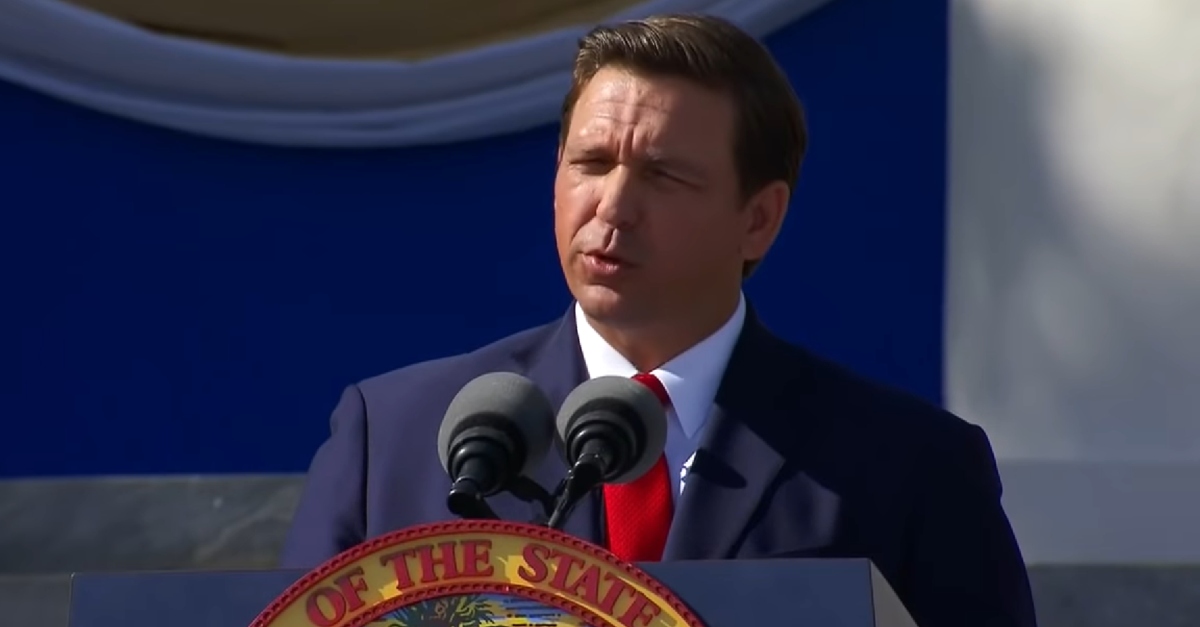
Ron DeSantis
The Florida Supreme Court on Thursday said the state’s 2018 Amendment 4 referendum requires former felons to complete “all legal financial obligations” (LFOs) before their voting rights can be restored.
The 36-page advisory opinion concluded that the Amendment’s language, which restores the voting rights of certain convicted felons “upon completion of all terms of sentence including parole or probation,” clearly included LFOs such as fines, restitution, costs, and fees ordered by sentencing courts.
“We conclude that the phrase, when read and understood in context, plainly refers to obligations and includes ‘all’ — not some — LFOs imposed in conjunction with an adjudication of guilt,” the justices wrote.
The particular meaning of the phrase “all terms of sentence” has become a major partisan point of contention since Amendment 4 was overwhelmingly approved by more than 65-percent of voters in 2018.
Amendment 4 was expected to restore 1.5 million previously disenfranchised Floridians with the right to vote.
The measure affected roughly seven-percent of the state’s population, but disproportionately impacted the African American population. Under the prior system of disenfranchisement, nearly 20-percent of Florida’s black population–which overwhelmingly votes for Democrats over Republicans–had been denied the right to vote.
To prevent franchising a new bloc of Democratic voters, the state’s GOP legislature passed SB 7066 in May, which undermined Amendment 4 by preconditioning the restoration of voting rights on the ability of formerly incarcerated individuals to pay–sometimes massive–fines, fees and restitution.
Though Thursday’s opinion does not have any immediate legal consequences, it stands a major victory for Republican Governor Ron DeSantis and the state’s GOP legislature. It could prove significantly influential to ongoing legal proceedings pertaining to the Amendment.
A Florida federal court previously ruled that it was unconstitutional to deny individuals with prior felony convictions the right to vote based on their inability to pay fees and fines.
[T]he State of Florida cannot deny restoration of a felon’s right to vote solely because the felon does not have the financial resources necessary to pay restitution,” U.S. District Judge Robert Hinkle wrote in his October opinion. “And because, for this purpose, there is no reason to treat restitution differently from other financial obligations included in a sentence, Florida also cannot deny restoration of a felon’s right to vote solely because the felon does not have the financial resources to pay the other financial obligations.”
Nancy Abudu, the deputy legal director for the Southern Poverty Law Center (which filed the initial lawsuit against the state), immediately denounced the advisory opinion.
“By holding Floridians’ right to vote hostage, the Florida Supreme Court is permitting the unconstitutional modern-day poll tax in SB 7066, and redefining an amendment nearly 65 percent of Florida voters approved of in 2018,” Abudu said in a statement.
Read the full Florida Supreme Court Opinion below:
FL Amend 4 Opinion by Law&Crime on Scribd
(Colin Kalmbacher contributed to this report)
[image via Fox News]